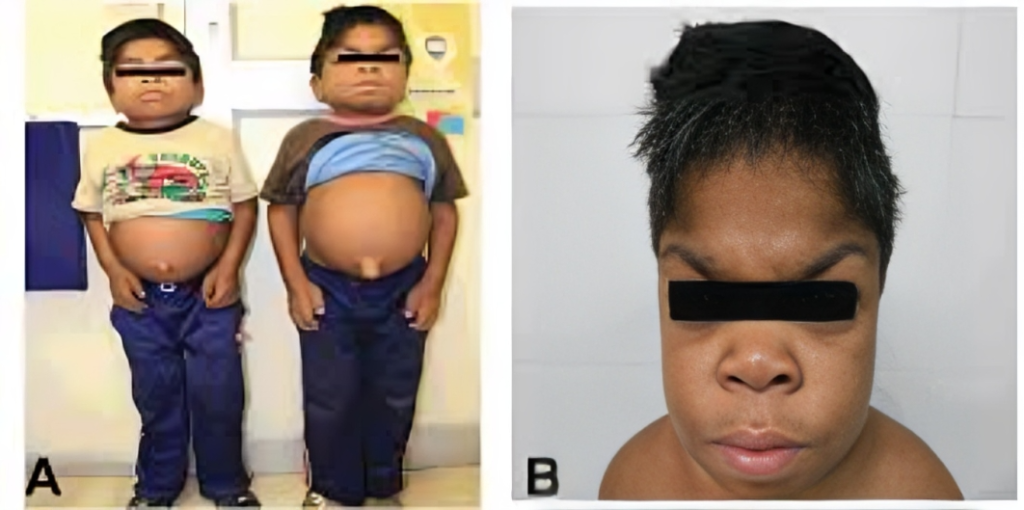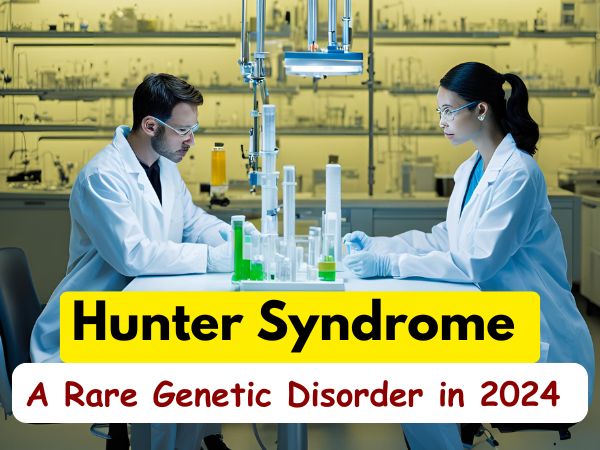Introduction to Hunter Syndrome
1.1 What is Hunter Syndrome?
Hunter Syndrome, also known as mucopolysidosis type II (PS II), is rare genetic disorder caused by the body’s inability to break down certain carbohydrates due to the deficiency of the enzyme iduronate-2-sulfatase (IDS). This condition leads to the accumulation of these substances in cells, causing various health issues, including growth developmental challenges.
First discovered in the 1910s by Dr. Charles Hunter, this syndrome has since shed light on the importance of awareness and education regarding rare genetic disorders.
1.2 Genetics of Hunter Syndrome

Hunter Syndrome is caused by mutations in the IDS gene, located on the X chromosome. Since this gene is X-linked, the disorder predominantly affects males, while females may be carriers and exhibit milder symptoms.
The IDS gene is crucial for breaking down glycosaminoglycans, which are essential for the proper functioning of various tissues in the body. When the gene is mutated, these substances accumulate, leading to the various symptoms associated with Hunter Syndrome.
1.3 Prevalence and Demographics
Hunter Syndrome is estimated to affect approximately 1 in 162,000 live births globally. While it occurs in various populations, certain demographic factors might influence its prevalence. The condition is more commonly seen in males, with females generally experiencing a milder form of the disease. Geographic variations exist, with higher reports in some regions than in others, showcasing the need for consistent data collection across the globe.
2. Symptoms and Diagnosis of Hunter Syndrome

2.1 Common Symptoms
The symptoms of Hunter Syndrome can vary widely, but they often include:
- Physical Symptoms: Growth delays, skeletal abnormalities (including joint stiffness and dysplasia), and distinct facial features such as a broad nose and enlarged tongue.
- Neurological Symptoms: Cognitive impairments can present as developmental delays, learning difficulties, or behavioral challenges, significantly impacting daily life.
- Systemic Symptoms: Affected individuals may also encounter cardiovascular issues like heart valve disease and respiratory problems, complicating the management of their overall health.
2.2 Diagnostic Procedures
Early diagnosis of Hunter Syndrome is critical for effective management. Diagnostic procedures typically include:
- Urine Tests: Screening for elevated levels of glycosaminoglycans can indicate the presence of the disorder.
- Enzyme Assays: These tests measure the activity of the IDS enzyme to confirm a diagnosis.
- Genetic Testing: Genetic testing can provide definitive confirmation of an IDS gene mutation, allowing for informed family planning and management strategies.
2.3 Challenges in Diagnosis
Diagnosing Hunter Syndrome can be challenging due to overlapping symptoms with other conditions. It can often lead to delays in diagnosis, which can be emotionally taxing for families. There’s a crucial need for clinical vigilance among healthcare professionals to distinguish between similar disorders, and thorough training can enhance awareness, ensuring families receive timely support and answers.
3. Treatment and Management Strategies
3.1 Current Treatment Options
While there is no cure for Hunter Syndrome, several treatment options are available to manage symptoms:
- Enzyme Replacement Therapy (ERT): This is the standard treatment wherein patients receive infusions of the IDS enzyme to supplement the body’s deficiency.
- Supporting Treatments: Physical and occupational therapies can enhance mobility and improve daily functioning.
- Experimental Therapies: Ongoing clinical trials are exploring new treatments, including gene therapy approaches that may offer hope in the future.
3.2 Managing Symptoms and Quality of Life
A multidisciplinary care team is vital in managing Hunter Syndrome effectively. Managing symptoms might include:
- Symptom Management Strategies: Pain relief methods, mobility aids, and assistive devices can profoundly enhance the quality of life.
- Psychological Support: Counseling services for patients and families help address the emotional aspects of living with a chronic condition.
3.3 Prognosis and Life Expectancy
Living with Hunter Syndrome poses several long-term health considerations. Unfortunately, there is no cure for Hunter syndrome. The most severe cases can be life-threatening, with a life expectancy typically between 10 and 20 years. Transitioning care is essential as patients grow, ensuring consistent support throughout their lives. Lifelong follow-up care is crucial to monitor health changes and adapt management strategies.
4. Family and Social Impact of Hunter Syndrome
4.1 Emotional and Psychological Effects
Receiving a diagnosis of Hunter Syndrome can be overwhelming for families. The emotional impact is significant, leading to challenges in coping with the unknown. Support systems, including counseling and support groups, are vital to help families navigate these feelings and foster understanding among siblings as well.
4.2 Financial Implications
The financial burden associated with treating Hunter Syndrome can be considerable, with costs linked to therapies, medications, and supporting treatments. Insurance coverage varies, and many families face hurdles in affording necessary care. Thankfully, numerous resources and organizations exist to provide financial assistance for families in need.
4.3 Advocacy and Support Networks
Patient advocacy organizations play a critical role in raising awareness about Hunter Syndrome. They provide invaluable resources for families, fostering community connections and facilitating education. Getting involved with local or national organizations can benefit families and contribute to broader awareness efforts.
5. Research and Future Directions
5.1 Current Research Initiatives
Research focused on Hunter Syndrome is expanding, with numerous studies exploring novel treatment options, gene therapy possibilities, and improved diagnostic techniques. Ongoing investments in research are vital to help deepen our understanding of this complex condition.
5.2 The Role of Technology in Treatment
Technological advancements have the potential to revolutionize treatment for Hunter Syndrome. Innovations in biotechnology, such as telemedicine, offer new ways for patients to receive care and support from specialists, regardless of their geographic location.
5.3 Hope for the Future
Emerging gene-editing techniques show promise in potentially curing or significantly reducing the symptoms of Hunter Syndrome. Community involvement in research and advocacy is crucial to drive these innovations. Together, we can work towards a future where understanding and managing Hunter Syndrome is significantly improved.
Conclusion
This guide presents a comprehensive understanding of Hunter Syndrome, from the genetics behind it to the emotional and social impact on families. It underscores the significance of ongoing education, research, and advocacy towards improving the lives of those affected. Let’s join hands in raising awareness and supporting research funding to pave the way for advancements in treatment and care.
FAQs
- What causes Hunter syndrome?
Hunter syndrome is caused by mutations in the IDS gene, leading to a deficiency of the IDUA enzyme responsible for breaking down certain complex sugars.
2. How is Hunter syndrome inherited?
Hunter syndrome is inherited in an X-linked recessive manner, mostly affecting males, while females can be carriers with milder symptoms.
3. What treatments are available for Hunter syndrome?
Treatment options mainly include enzyme replacement therapy, physical and occupational therapy, and participation in clinical trials for experimental therapies.
4. Can Hunter syndrome be cured?
Currently, there is no cure for Hunter syndrome, but ongoing research promises advancements in management and potential future breakthroughs.
5. What resources are available for families affected by Hunter syndrome?
Various advocacy organizations offer resources, support networks, and financial assistance to families dealing with Hunter syndrome.
